
In the complex world of shipping and logistics, one term that often pops up but is seldom fully understood is freight insurance. It’s the safety net that wraps around your valuables, ensuring they’re protected from various risks during transit. This blog post will unravel the mysteries of freight insurance, showing you why it’s not just a good idea, but a cornerstone of hassle-free shipping.
Understanding Freight Insurance Basics
Freight insurance, at its core, is designed to protect shippers from the myriad of risks that goods face while in transit. From damage during loading and unloading to losses from natural disasters, freight insurance covers a spectrum of unforeseen circumstances. It’s a shield against the unpredictable, ensuring that businesses aren’t left out of pocket when things go awry. Whether you’re shipping domestically or internationally, understanding the basics of freight insurance is the first step to safeguarding your shipments against the unpredictable nature of the logistics world.
The general assumption might be that freight insurance is a complex jumble of unnecessary legaleze. However, it boils down to one simple concept: protection. For businesses that send or receive goods, this type of insurance provides a crucial layer of financial safety, compensating for losses that could otherwise seriously impact operations. It’s not just about fulfilling legal requirements; it’s about building a resilient logistics strategy that accounts for the unexpected.
Why Freight Insurance is Essential for Your Business
Consider for a moment the butterfly effect in global logistics; a delay or damage in one shipment can ripple through an entire supply chain, causing untold disruption. This is where freight insurance becomes not just beneficial, but essential. It acts as a safeguard, ensuring that when disruptions happen, they don’t escalate into financially damaging situations. The cost of premiums pales in comparison to the potential losses from damaged, lost, or delayed shipments.
In today’s fast-paced market, customers have high expectations for the speed and integrity of their deliveries. A business’s reputation hinges not just on the quality of its products, but also on its ability to deliver those products reliably. Freight insurance offers a layer of security that contributes significantly to customer satisfaction, reinforcing trust in your brand. It’s a critical element in building and maintaining the reliability that customers expect, protecting not just the physical goods, but the promise of your brand.
Types of Freight Insurance Coverage
There’s no one-size-fits-all when it comes to freight insurance, and understanding the different types of coverage available is key to choosing the right one for your needs. Broadly, coverage can range from limited liability, which provides minimal protection, to all-risk policies that cover a wide array of potential dangers. Specialty policies for high-value or hazardous goods can also be tailored to fit specific shipping requirements, offering peace of mind regardless of the cargo’s nature.
Decoding the specifics of each policy type can be like navigating a labyrinth. All-risk insurance is often the most comprehensive, covering losses from external factors like natural disasters, theft, or vandalism. On the other hand, named perils policies offer protection against a specific list of risks. With the diversity of products shipped globally, the capacity to customize policies ensures that businesses can securely transport goods across the vast expanse of oceans and continents without undue worry.
High-value items and perishable goods present unique challenges in shipping, necessitating specialized freight insurance policies. These tailored solutions consider factors like the intrinsic value of the items, the risk of spoilage, and the complexities of international regulations. Whether it’s artwork, electronics, or pharmaceuticals, specialized insurance acts as a bespoke suit of armor, finely tuned to protect against the specific perils these goods face during transit.
The Claim Process Simplified
For many business owners, the thought of navigating the claims process can be daunting. However, with the right guidance and understanding, it doesn’t need to be. Essentially, it begins with noticing the carrier or insurance provider immediately after discovering the loss or damage. Documentation is key; having comprehensive records and evidence of the damage accelerates the process. The more equipped you are with information, the smoother the journey towards settlement can be.
Stepping into the claims process might seem like entering a maze, but knowing the basics can turn it into a straightforward path. Timeliness is crucial; delays in notification or paperwork submission can create obstacles to claim acceptance. Also, understanding the insurer’s terms and what documentation they require (such as photos of the damage, shipping documents, and receipts) can preemptively streamline the claims process, ensuring businesses can recover their losses with minimal disruption.
How to Choose the Right Freight Insurance Policy
Choosing the right freight insurance policy is akin to selecting the best safety gear for a treacherous journey; it requires careful consideration of what’s at stake. Factors to weigh include the value of the shipped goods, the route’s potential hazards, and your company’s risk tolerance. Consulting with an insurance broker who understands the nuances of cargo shipping can illuminate the path to the policy that best fits your logistical needs.
The final step in securing freight insurance is understanding the fine print. Policies can have exclusions that significantly impact coverage, such as acts of God, war, or certain types of handling damage. By thoroughly reviewing a policy’s terms, alongside trusted advice from insurance professionals, businesses can ensure they’re adequately covered without paying for unnecessary protections. It’s not just about having insurance; it’s about having the right insurance tailored to the specific risks your shipments face.
Securing Your Cargo’s Journey
Navigating the shipping industry’s complexities can be daunting, but understanding the importance of freight insurance brings a beacon of clarity. With the right policy, businesses can sail through the logistical challenges, anchored securely against potential losses. Freight insurance isn’t just about compliance or ticking off a checklist; it’s an investment in peace of mind. Whether you’re shipping goods across borders or within the same country, ensuring you have adequate freight insurance coverage is a testament to smart, proactive business management.






